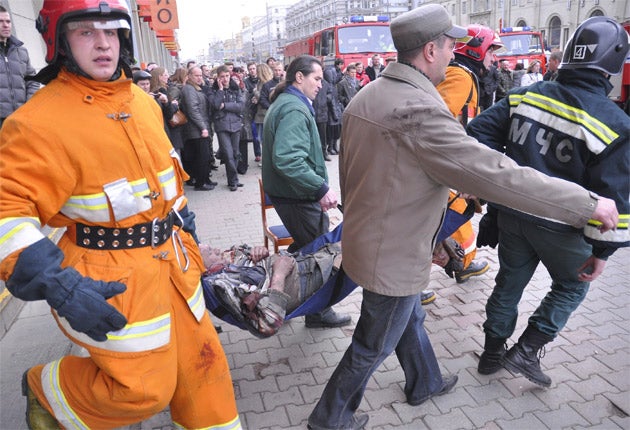Lukashenko blames 'nauseating' democracy for Minsk bomb blast

The last vestiges of the beleaguered opposition in Belarus are prepared for further repression after the country's authoritarian president blamed the "nauseating" force of democracy for a terrorist attack on the capital.
A bomb struck a central Minsk metro station during evening rush hour on 11 April, killing 13 and injuring more than 200 people. Authorities have arrested five people in connection with the blast, including a 25-year-old man who is said to have placed the device on the station.
Alexander Lukashenko, president of Belarus since 1994 and known as "the last dictator in Europe", has angrily rejected suggestions by Belarusian bloggers that the authorities might have been behind the blast in a country that has little history of terrorism.
According to the Russian website Life News, the main suspect is Dmitry Konovalov, who worked in a factory that produced spare parts for tractors in the city of Vitebsk. Sources in the Belarusian secret services say that Konovalov was a pyrotechnic who had been interested in explosives since a young age, but add that he was paid a large sum of money for setting off the bomb, by unknown figures.
Whatever the truth is behind the bombing, it is clear that the authorities aim to use the situation to crack down on an opposition Mr Lukashenko calls a "fifth column", in the pay of foreign enemies out to destabilise Belarus.
In an address to parliament on Thursday, Mr Lukashenko said that more than anything, an excess of democracy had led to the bomb blast. "Before the elections we became so democratic that it made you and me giddy," he said. "There was so much democracy, it was just nauseating."
The European Union had promised Belarus financial aid if Mr Lukashenko took steps to democratise, and before the December presidential election there was a more relaxed approach, with opposition candidates given some television time.
In the end, international observers said Mr Lukashenko fixed the vote. After an overwhelming win was announced, handing him another five-year term at the helm of a country he has run since 1994, police crushed protestors who took to the streets of Minsk to urge change.
Hundreds of people were arrested, including most opposition candidates who stood against Mr Lukashenko. Many of them remain behind bars, facing prison terms of up to 15 years for organising the protests.
Of all the states to have emerged from the Soviet Union two decades ago, Belarus has perhaps changed least. Almost all the economy is in state hands, the media is tightly controlled, and there is little political debate. Mr Lukashenko is genuinely popular for the political stability he has brought but analysts say that is eroding as the country's economic situation worsens. Opposition politicians say independent polling shows they have the support of around half the country. In his address to parliament, Mr Lukashenko denied Belarus needed political change, and said democracy should be "limited to the square metre around where you are standing."
Alexander Lebedko, recently freed from jail, said the main problem was not a surfeit of democracy but "the most acute lack of democracy".
"The authorities are trying to create the impression of an enemy to get away from the real economic problems," he said yesterday.
Subscribe to Independent Premium to bookmark this article
Want to bookmark your favourite articles and stories to read or reference later? Start your Independent Premium subscription today.

Join our commenting forum
Join thought-provoking conversations, follow other Independent readers and see their replies